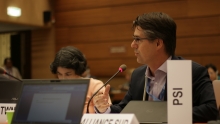Unions and Civil Society highlight need for fairer tax and trade rules, less private-sector emphasis at UNCTAD hearing.

The hearing saw a range of speakers highlight how the Conference should not promote failed private-sector development strategies which have increased inequality and undermined the public sector.
Daniel Bertossa, PSI’s head of Policy and Governance said:
"What we're seeing globally is an investment strike. Multinational corporations are accumulating capital in offshore tax havens rather than reinvesting. We need to ensure multinationals pay their fair share of tax and use this revenue to drive public sector growth through investment in universal, quality public services."
The negotiating text released so far shows an unduly optimistic emphasis on private-sector favoured mechanisms such as Public-Private Partnerships which are described as “an effective way to fund infrastructure.” Bertossa highlighted how such language ignores the risks and failures of PPPs, which an increasing body of research is underlining.
Tax Justice Network, EURODAD, Alliance Sud and the Third World Network all joined PSI in calling for a stronger commitment regarding illicit financial flows, tax evasion and avoidance and a more equitable international trade regime, better attuned to the interests of developing countries. Increased investor-rights have prohibited developing countries from pursuing cleaner, future focused policies, such as in India where increased IP restrictions and time-frames made the phase out of ozone-damaging CFC chemicals unaffordable.
PSI along with our Civil Society allies will be working to ensure that the role of the public sector in driving meaningful investment, growth and development is not undermined at UNCTAD14. Although other international bodies such as the WTO, World Bank and the IMF have long been private-sector cheerleaders, UNCTAD has thus far maintained a unique position in bringing a more nuanced, development-focused approach to trade and PSI aims to affirm UNCTAD’s mandate in this regard.

